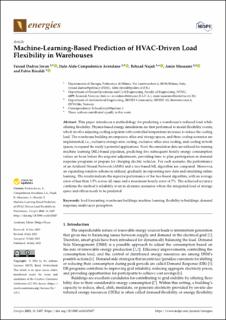Machine-Learning-Based Prediction of HVAC-Driven Load Flexibility in Warehouses
Javan, Farzad Dadras; Avendano, Italo Aldo Campodonico; Najafi, Behzad; Moazami, Amin Nitter; Rinaldi, Fabio
Peer reviewed, Journal article
Published version
Permanent lenke
https://hdl.handle.net/11250/3081934Utgivelsesdato
2023Metadata
Vis full innførselSamlinger
- Publikasjoner fra CRIStin - SINTEF AS [5654]
- SINTEF Community [2236]
Originalversjon
10.3390/en16145407Sammendrag
This paper introduces a methodology for predicting a warehouse’s reduced load while offering flexibility. Physics-based energy simulations are first performed to model flexibility events, which involve adjusting cooling setpoints with controlled temperature increases to reduce the cooling load. The warehouse building encompasses office and storage spaces, and three cooling scenarios are implemented, i.e., exclusive storage area cooling, exclusive office area cooling, and cooling in both spaces, to expand the study’s potential applications. Next, the simulation data are utilized for training machine learning (ML)-based pipelines, predicting five subsequent hourly energy consumption values an hour before the setpoint adjustments, providing time to plan participation in demand response programs or prepare for charging electric vehicles. For each scenario, the performance of an Artificial Neural Network (ANN) and a tree-based ML algorithm are compared. Moreover, an expanding window scheme is utilized, gradually incorporating new data and emulating online learning. The results indicate the superior performance of the tree-based algorithm, with an average error of less than 3.5% across all cases and a maximum hourly error of 7%. The achieved accuracy confirms the method’s reliability even in dynamic scenarios where the integrated load of storage space and offices needs to be predicted.

